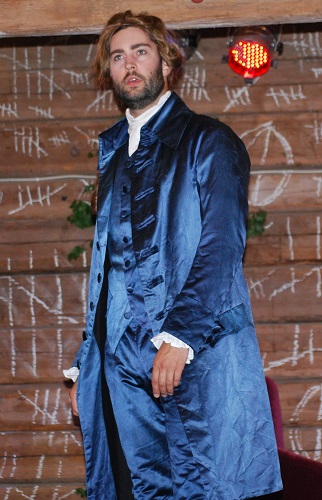 Sweden Mozart, Don Giovanni: Soloists, Jacob Piamorex Moscowicz (piano), Anna Eklund Tarantino (director), The Barn, Strandbacken Public Park, Dala-Floda 9.8.2017. (GF)
Sweden Mozart, Don Giovanni: Soloists, Jacob Piamorex Moscowicz (piano), Anna Eklund Tarantino (director), The Barn, Strandbacken Public Park, Dala-Floda 9.8.2017. (GF)

Cast:
Don Giovanni – Caspar Engdahl
Leporello – Erik Johansson
Donna Elvira – Stina Lindberg
Donna Anna – Matilda Sterby
Don Ottavio – John Haque
Zerlina – Jessica Elevant
Masetto – Joel Dosi Holmqvist
Il Commendatore – Joel Kyhle
Extra – Lilja Gurung
Don Giovanni is not only a libertine and notorious seducer. He is also a representative of the pre-French Revolution upper classes, who ruled the commoners with impunity. In Mozart’s world, the Count in Le nozze di Figaro is similar character. Ultimately, both are forced to eat humble pie. In the Dala-Floda production with a local twist, the Don is also a representative of the jet-set from the big city (read Stockholm) as opposed to the rural population in the province of Dalecarlia. This is unerringly described in the reduced chamber-sized production – also Anna Eklund Tarantino’s debut as director. She maintains she has not done much: it is the singers who have created believable characters. And I heartily agree, since I was deeply impressed by the acting, especially since several of the youngish cast have only just launched their careers. But the overriding concept is Anna’s, and this involves a heavy reduction of the score: there is no orchestra – but Jacob Piamorex Moscowicz at the electric piano is as always a wonderful substitute for strings and wind instruments – the overture is gone – no great loss under the prevailing circumstances – and many of the recitatives and the musical numbers have been cut. But what remains is far more than a torso, it is a good representation of the downfall of Don Giovanni.
There are other changes as well: in the turmoil at the end of the first act, Leporello, to protect his master, kills Don Ottavio. When the audience return after the interval, Ottavio’s dead body is still lying on the stage and his betrothed Donna Anna is mourning and sings her aria to her beloved husband-to-be. A controversial change perhaps, but not an unlikely one. When Don Giovanni kills the Commendatore, instead of the statue there is little Lilja Gurung, dressed in white and emerging from the audience like an angel. Is she the Angel of Death? Another typical feature of this sparse production is that when Don Giovanni and Leporello change clothes in the second act, Leporello simply hands over his sunglasses to the Don. Everybody understands the symbolism. A truly moving scene is Don Giovanni’s serenade. He sits down at the end of the “apron” extending out into the audience and sings it to two girls with Down’s syndrome, even taking their hands. The finale is also moving. Instead of the joyous ensemble, rejoicing in the death of the libertine, the three female characters and the little angel enter the stage, singing a beautiful well known Swedish folk song – and the audience join in. Some more local colour that was much appreciated.
The quality of the singing was generally on a high level. One has to marvel at how many excellent singers there are today. The growth rate is certainly impressive in this field. It is maybe unfair to single out individual singers, but the experienced Erik Johansson was a brilliant Leporello with superb timing. His catalogue aria also had a local twist. Among Don Giovanni’s conquests, those in Floda were 1003! (There are 700 inhabitants in Floda!) Caspar Engdahl, whom I have praised on several occasions, was in his element in the title role. With his dashing appearance, expressive acting and both subtle and powerful singing, he dominated every scene when on stage. He told me afterwards that he was encouraged to take on this role by Peter Mattei, himself the world’s leading exponent of the role. Mattei heard him at a concert in Dala-Floda last year singing Leporello’s catalogue aria and commended him while pointing out that “you are a Don Giovanni, not a Leporello”. A brilliant prediction indeed.
Once again, Dala-Floda Opera Festival has produced a winner which everybody involved should feel proud of.
Göran Forsling
